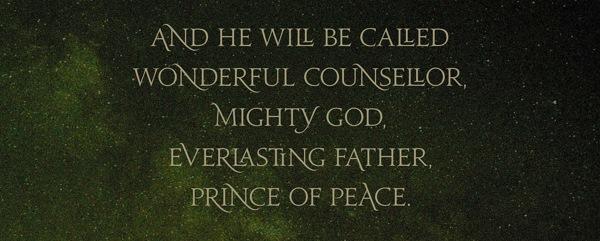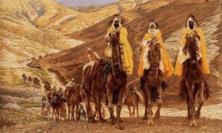‘Wonderful Counsellor, Mighty God, Everlasting Father, Prince of Peace’: this grand and evocative list from the book of Isaiah is read to us at Midnight Mass on Christmas Day each year. Thinking Faith’s Advent series will consider how each of these titles can kindle our imaginations as we prepare to celebrate the gift of the Incarnation. Karen Eliasen sets the scene by exploring the significance of this ‘remarkable list of names’ as it appears in Isaiah 9:6.
Any foray into the writings of the prophet Isaiah soon calls attention to a number of confusing issues that hamper a straightforward reading. Already as soon as we try to pinpoint the man behind the name Isaiah we run into trouble, for we meet possibly three different prophets. The first – proto-Isaiah – is active in the 8th century of King Hezekiah’s dicey dealings with the war-mongering Assyrians; the second – deutero-Isaiah – is active in the 6th century of uprooted Exiles despairing among Babylonians and eventually Persians; and the third – trito-Isaiah – is active in the 5th century that sees a self-examining but kingless people returned to Jerusalem. Add to this historical havoc a mix of literary forms whose language is complex and often elusive; some conflicting evaluations of human behaviour, especially of kings; and finally some unsettling images of a God caught in flagrante delicto swinging wildly between the extreme moods of desolation and consolation. After combining all these strong flavours of the book of Isaiah we may find ourselves readily agreeing with Martin Luther’s summary of the prophets: they ‘have a queer way of talking, like people who, instead of proceeding in an orderly manner, ramble off from one thing to the next, so that you cannot make head or tail of them.’[1]
How then can we begin to make head or tail of the remarkable list of names in Isaiah 9:6 that rambles out at us anew every Christmas:[2] ‘and his name shall be called Wonderful Counsellor, Mighty God, Everlasting Father, Prince of Peace?’ If there is one verse in the whole of the Old Testament that begs engagement with the classic ‘who, what, when, where, why and how’ series of questions, then this may well be it – even if we as Christians may have our hardcore convictions about the answers: ‘Jesus!’ of course, and so on from there. But all may not be so obvious. In a recent introduction to the book of Isaiah, writer and critic Peter Ackroyd claims it as ‘a story of universal significance rather than a sample of pre-Christian revelation,’ holding that what is at stake for Isaiah are ‘the central aspirations of humankind.’[3] The reality is that not only for Christians but as well for Jews has the book of Isaiah down the centuries been the most oft-cited, and perhaps even the best-loved, of the prophetic books. This eager response across the board suggests that as Christians we might explore more deeply those ‘central aspirations of human kind’ by revisiting that familiar list of names in 9:6 from a broader perspective than we are wont to do.
Of particular interest is the use Jewish liturgy makes of the list of names. Obviously the mainstream Jewish understanding of the verses around ‘a child born’ contrasts sharply with the Christian understanding by applying the reference to the immediate past rather than a messianic future. The Hebrew grammar certainly supports this (the child has already been born, therefore possibly refers to Hezekiah), although this may also be a case of the so-called ‘prophetic past’ by which a particular future is treated as unquestionably guaranteed by referring to it as if it has already happened.[4] But considering this kind of tense quibbling as an end in itself may not be a fruitful way of proceeding, any more than pinpointing three different centuries for Isaiah’s prophetic activities. Rather, bearing in mind that awareness of ‘central human aspirations’ pervading the book of Isaiah across time and place, still stirring us as readers today, we can turn to the Jewish liturgy itself.
In Jewish liturgy, the weekly Saturday readings from the Torah (i.e. from the Five Books of Moses) are accompanied by additional readings taken from the other Biblical books, called the Haftarah readings. Each of the 52 weekly Torah texts has its own prescribed Haftarah accompaniment, and it so happens that the Isaianic list of names is part of a text matched with a reading from Exodus, Ex 18:1-20:23 to be exact. Within these Exodus chapters two important events in the history of Israel take place: firstly, there is a very sober conversation between Moses and his father-in-law Jethro about the practical organisation of what is basically a judiciary for settling disputes amongst the Israelites themselves – bringing law and order to the community. No fireworks and tantrums here, but a great deal of quiet common sense about leadership and judicial teachings. Secondly, there is the giving of the Ten Commandments to the Israelites at the foot of Mount Sinai, which takes place in anything but sober circumstances – tensions and fears run high in this fiery encounter between God and people as God spells out his demands. Both events are takes on the creation of a just society and the practice of accountable leadership within such a society – as central as human aspirations can get. But where one take coolly spreads roles of responsibility amongst capable but God-sensitive human beings, the other hotly proclaims God’s sole right to be the one and only everything. Humans may be assured that we are made in God’s image (Gen 1:27), but if there is one thing guaranteed to pique God’s old-style zealous wrath, it is our human habit of taking that assurance to a self-glorifying and greedy extreme. This wrath seems always to be threatening just around the corner – whether people are too far away from or too close to God. The giving of the Ten Commandments, even as it warns people of turning away from God, is hedged with dire warnings of the danger of approaching God too closely: ‘let not the priests or the people break through to come up to the Lord, lest He break out against them’ (Ex 19:24).
These Exodus issues around the creation of a just society and the consequences for that society of the human desire to be and act like God, are reiterated and given further intense and unsettling treatment in the book of Isaiah. Human rulers, the very people commissioned and empowered with keeping law and order, enter and exit the Isaianic stage. Some are Israelite and some foreign, some more powerful than others, some marginally nicer than others, some outright evil; yet none of them seem to have the wherewithal to put into practice a just society as Moses and Jethro have mapped it out, let alone as so fierily proclaimed in the Ten Commandments – although some are looked upon less disapprovingly (Hezekiah and Cyrus come to mind). The interplay between being made in the image of God yet not comparable to him remains an elusive metaphorical paradox well-nigh impossible to live out, even as we get hints along the way. So how are we to answer the question repeatedly hammered home in the book of Isaiah: ‘To whom then will you liken God, or what likeness compare with him?’ (Isa 40:18)? [5] To whom indeed – what then are we humans as leaders supposed to be like?
That list in Isaiah 9:6 may well be the most focused and concentrated formulation the Old Testament has to offer for addressing this question directly. Martin Luther, in his honest struggles to make head and tail of the prophets, hits the nail on the head in one of his Christmas sermons on Isaiah 9:6 when he relates the name list directly to the ‘how’ of leadership. After expanding on the customary images of leaders and authorities being carried on their subjects’ shoulders (even the good ones are), Luther observes that Isaiah turns everything around by placing the subjects on the shoulders of this different kind of ruler: ‘Thus, here you see the very definition of the Son, the one who carries his subjects on his shoulders. Those who are not on his shoulder are not under his rule. … So hop on! … This message goes forth into the world … by adding these six names, the prophet explains how the carrying takes place.’[6] That these descriptive terms, ‘Wonderful Counsellor, Mighty God, Everlasting Father, Prince of Peace’, in some concrete way explain the ‘how’ of leadership in a just society may be completely at odds with the significance we moderns in the West give to names. In answer to the question, ‘what’s in a name?’, chances are Shakespeare’s Juliet neatly sums it up for us:
'Tis but thy name that is my enemy; Thou art thyself, though not a Montague. What's Montague? it is nor hand, nor foot, Nor arm, nor face, nor any other part Belonging to a man. O, be some other name! What's in a name? that which we call a rose By any other name would smell as sweet;
But the Isaianic mind-set, the ancient Hebrew mind-set, participates in a completely different understanding of the significance of names. It hangs on names an ontological significance that fundamentally links name and existence, a linking that seems to belong to the nature of the Biblical Hebrew language itself. Old Testament scholar John L. McKenzie’s concise observation is helpful here: ‘(Hebrew language) prefers nouns to adjectives, for it does not even like to make the obvious distinction between a substance and its properties.’[7] The series of words in Isaiah 9:6, however we wish to split and splice the grammar and theological meanings, suggests deeply-rooted qualities that are not merely fine-sounding abstract concepts, but are concrete, embodied qualities, drives even, to be lived out. These particular qualities and drives lead to the direct practice of knowledge and power and embodied behaviour in the context of a just society, to walking the talk. Given the conflict between God and human images of God, it is not untoward to ask to whom these qualities and drives then belong – who are they actually naming, the child or God? In a satisfying way, the answer is: both. Although these qualities appear in names definitely given to the child, the naming custom they express is straight out of the Ancient Near East, where Semitic names often consist of phrases or sentences that describe God. Therefore these names do not describe the child as much as they describe the God whom the child’s parents worship. After all else is said and done, worship may be the human act that makes the difference in the creation of a just society, not all the knowledge-posturing or power-mongering with which human leadership is so riddled. The God of the book of Isaiah puts it as bluntly as it can be put: ‘I am the Lord, the Holy One, the Creator of Israel, your King’ (Isa 43:15); if any practical gaps need filling in about what the God making this claim is like, in what sort of image we are made, then Isaiah 9:6 is a good place to start exploring.
Any talk of leadership qualities in a faith context is bound to nudge us in the direction of Ignatian spirituality. In his Spiritual Exercises Ignatius describes a meditation which in full is entitled ‘The call of the earthly king is a help towards contemplating the life of the Eternal King.’[8] Its two parts consist of imagining first a human king chosen by God – Ignatius describes such a king as ‘liberal and kind’ – and then imagining the Christ King. In both instances the imagination is pulled into play: how far do we think we can we walk the talk? What is at stake for us? It is a meditation that dovetails smoothly with Exodus and Isaiah as these ancient scriptures explore ‘central aspirations of humankind.’ Human leaders for better or for worse, the messiah-king who embodies fully the desired qualities of a ruler of a just society, God himself as the ultimate one and only responsible for everything that is … to say nothing of thee and me as we ponder the nature of Incarnation at its very best: Wonderful Counsellor, Mighty God, Everlasting Father, Prince of Peace.
Karen Eliasen works in spirituality at St Beuno’s Jesuit Spirituality Centre, North Wales.
[1] Quoted in John Goldingay’s very readable The Theology of the Book of Isaiah (IVP Academic 2014)
[2] Or for that matter at any time: witness Pope Francis’ homily at Madison Square Garden in New York earlier this year, which zeroed in on Isa 9:6.
[3] Peter Ackroyd’s introduction to The Book of Isaiah in the Pocket Canons series (Canongate, 1999). In refreshing contrast to Martin Luther, Ackroyd summarises the book of Isaiah as a ‘plangent combination of prophetic passages, with visionary epiphanies and lyrical enchantments.’
[4] Anyone interested in the details of the biblical Hebrew in Isaiah 9:5-6 can check out http://thejewishhome.org/counter/Isa9_56.pdf
[5] Alongside Isa 40:18 have a look at Isa 40:25; 46:5, 9. I like the explicitness of the variation in the book of Job: ‘Have you an arm like God, and can you thunder with a voice like his?’ (Job 40:9).
[6] See http://wordandworld.luthersem.edu/content/pdfs/16-4_Corinthians/16-4_Luther_Sermon.pdf It is not immediately obvious how Luther arrives at the number six.
[7] John L. McKenzie’s classic The Two-Edged Sword: An Interpretation of the Old Testament (The Bruce Publishing Company 1956)
[8] Spiritual Exercises [91]






